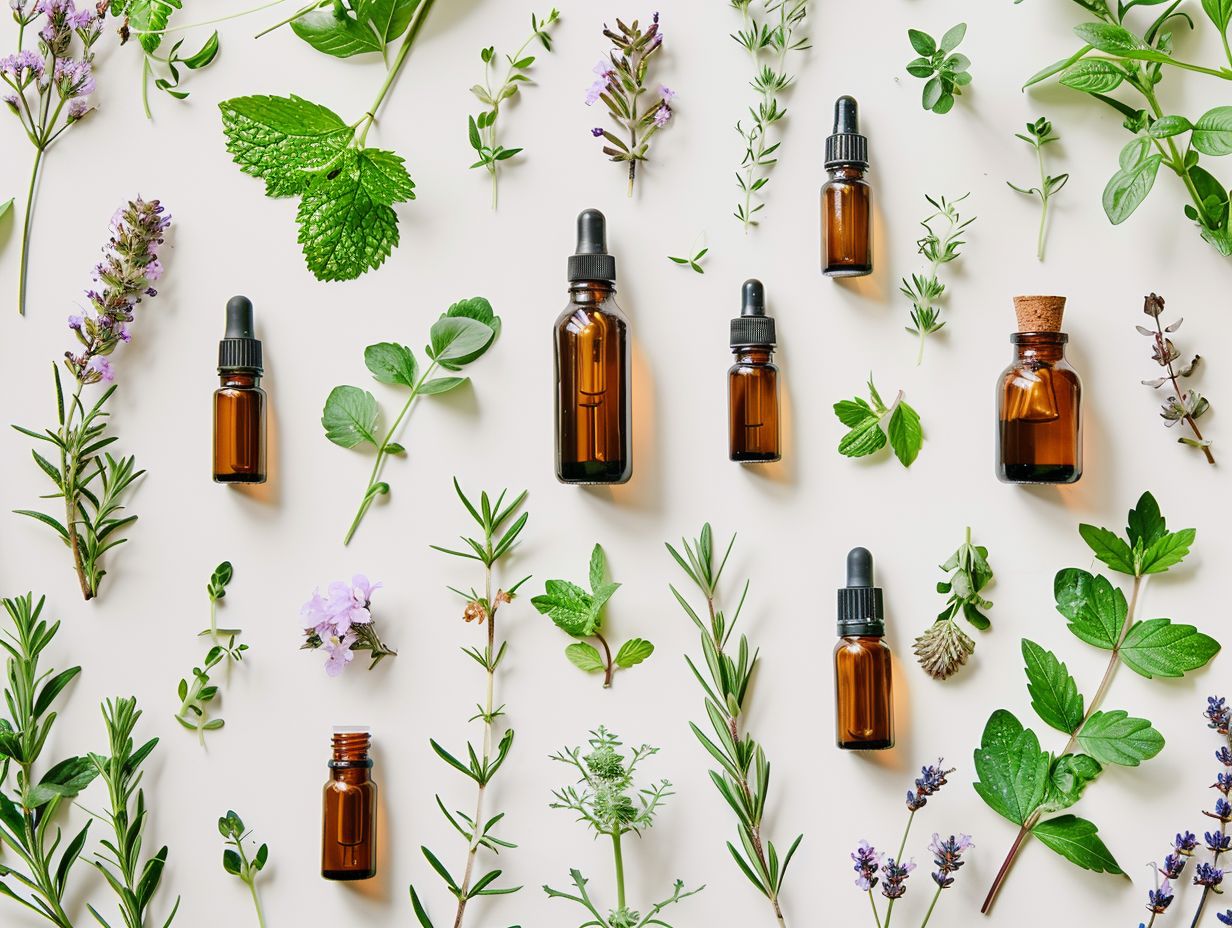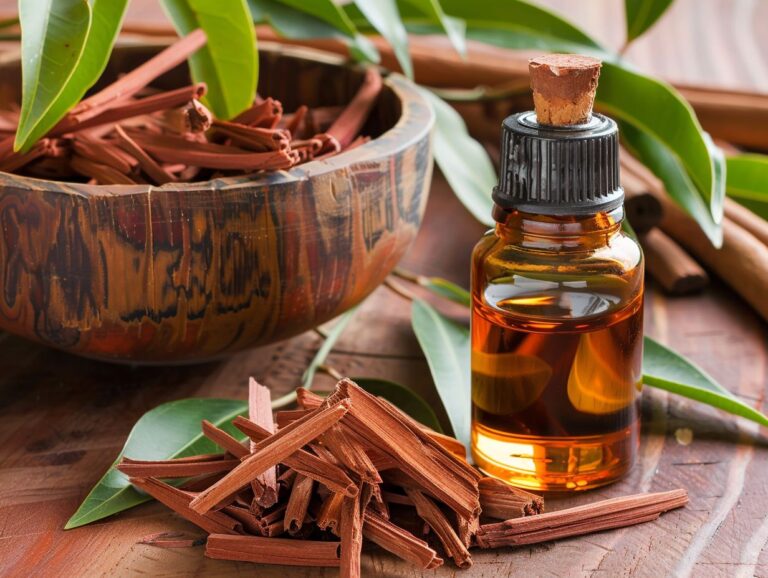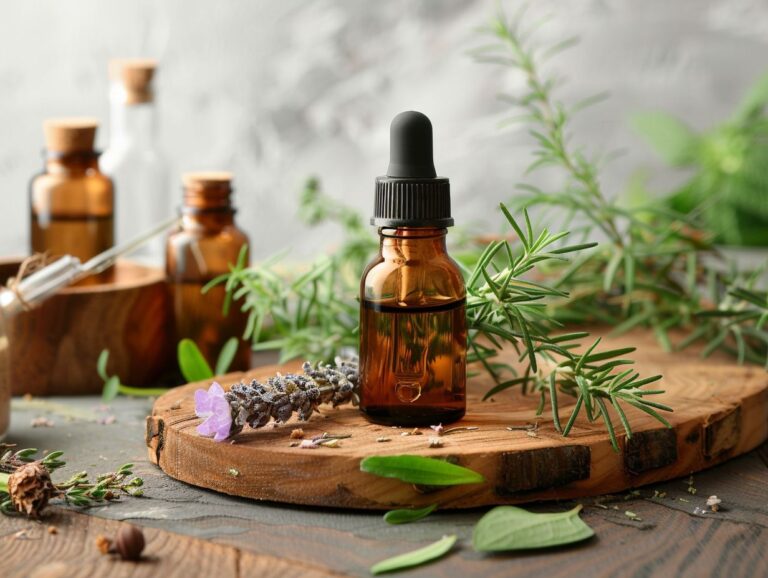Are Essential Oils Neurotoxic
Essential oils have gained popularity for their various health and wellness benefits, from aromatherapy to stress relief and even skincare.
However, as with any potent substance, there are potential risks to be aware of, including neurotoxicity.
In this article, we will explore what neurotoxicity is, reported cases of essential oil neurotoxicity, possible causes, and symptoms.
We will also provide tips on how to use essential oils safely and discuss alternative options for those who may want to avoid potential risks.
Key Takeaways:
What Are Essential Oils?
Essential oils are concentrated liquids derived from various aromatic plants. These plant-based volatile compounds are extracted through methods like distillation or cold pressing, capturing the essence and fragrance of the source plant.
Since ancient times, essential oils have played a pivotal role in traditional medicine and cultural practices due to their therapeutic properties and aroma. The extraction process involves distillation, where steam passes through the plant material and carries the volatile compounds, which are then condensed to form the oil.
Cold pressing, on the other hand, is used primarily for citrus oils, where mechanical pressure squeezes the oil out of the plant material. This method retains more of the oil’s natural properties.
How Are Essential Oils Used?
Essential oils find applications in various ways across different cultures and regions. They are commonly used for aromatherapy, topical application, and even ingestion in some traditional practices.
The cultural significance of essential oils is deeply rooted in history, with civilizations like the Egyptians, Greeks, and Romans incorporating these aromatic extracts into their rituals and ceremonies. Along with their therapeutic benefits, essential oils play a crucial role in skincare, offering natural alternatives to conventional beauty products. From promoting relaxation and stress relief to enhancing focus and energy levels, the versatile nature of essential oils continues to intrigue researchers and wellness enthusiasts worldwide.
What Are the Potential Benefits of Essential Oils?
Essential oils offer a wide range of potential benefits due to their biological activities. These volatile compounds can impact physiological outcomes and cognitive functions in various ways.
Research has shown that certain essential oils like lavender, peppermint, and rosemary have calming effects on the central nervous system, reducing stress and anxiety levels.
Additionally, aromatherapy using toxic essential oils has been found to enhance cognitive performance and improve memory retention.
Aromas from these oils can stimulate the limbic system, which plays a key role in emotions, long-term memory, and motivation.
Aromatherapy
Aromatherapy, a popular practice involving the use of aromatic volatile oils like lavender essential oil, has been known to promote relaxation and alleviate stress through the inhalation of fragrant essences.
Historically, aromatherapy dates back centuries to ancient civilizations like the Egyptians, Greeks, and Romans who used plant extracts for various therapeutic purposes. The essence of lavender oil is particularly renowned for its calming effects, making it a favored choice in aromatherapy for inducing relaxation and reducing anxiety levels. The stimulating properties of essential oils trigger the brain’s limbic system, responsible for emotions and memories, helping to uplift mood and enhance overall well-being. Aromatherapy is widely embraced today for its natural approach to improving mental health and promoting relaxation.
Stress Relief
Essential oils like rosemary contain neuroprotective properties that can aid in stress relief and mental clarity. The use of rosemary essential oil has shown promising effects on cognitive function and mood enhancement.
Research indicates that the aroma of rosemary essential oil can positively impact cognitive performance by increasing alertness and memory retention. Studies have revealed that inhaling rosemary oil may stimulate the production of neurotransmitters like acetylcholine, crucial for maintaining proper brain function.
The antioxidant properties of rosemary oil can help combat oxidative stress, a common factor in the development of neurodegenerative diseases. The potential benefits of rosemary oil extend beyond just its aromatic qualities, making it a valuable addition to natural remedies for mental well-being.
Skin Care

Essential oils from the citrus family, such as lemon grass, are commonly used in skincare products for their antiseptic and rejuvenating properties. The inclusion of lemon grass oil in skincare routines can promote healthy skin and combat various skin issues.
Regarding skincare, lemon grass oil stands out for its ability to cleanse and purify the skin, helping to control excess oil production and prevent breakouts. This fragrant oil is known for its uplifting and stress-relieving properties, making it a popular choice in essential oils dangers.
The application of lemon grass oil in skincare formulations not only aids in balancing the skin’s natural oils but also contributes to improving the skin’s overall texture and tone. Its antimicrobial properties help combat acne-causing bacteria, while its astringent qualities tighten pores and reduce inflammation.
Pain Relief
Essential oils like eucalyptus oil and camphor are known for their analgesic properties, providing effective pain relief when used in topical applications. The cooling sensation of eucalyptus oil and the numbing effect of camphor make them popular choices for alleviating various types of pain.
Regarding understanding the mechanisms of action behind the pain-relieving properties of these essential oils, research suggests that eucalyptus oil contains compounds like eucalyptol that exhibit anti-inflammatory and analgesic effects. These components work by interacting with pain receptors in the body, thereby reducing the perception of pain.
Similarly, camphor acts as a local anesthetic by desensitizing sensory nerve endings, ultimately blocking pain signals from reaching the brain. This dual approach of eucalyptus oil and camphor makes them a powerful combination for managing pain.
Are Essential Oils Neurotoxic?
The potential neurotoxicity of essential oils has raised concerns regarding their effects on the central nervous system. Some essential oils exhibit convulsant actions and neurotoxic properties under certain conditions.
For example, camphor and eucalyptus oils are known for their neurotoxic effects, with reported cases of seizures and respiratory distress upon ingestion or inhalation. The mechanisms underlying this neurotoxicity involve the ability of certain compounds in these oils to disrupt neurotransmitter signaling in the brain, leading to overstimulation of neurons.
The high concentrations of certain components, such as pulegone in pennyroyal oil, can directly impact ion channels in the nervous system, interfering with proper neuronal function and potentially triggering convulsant activity.
What Is Neurotoxicity?
Neurotoxicity refers to the harmful effects of substances on the nervous system, leading to various clinical manifestations. Essential oils with toxic properties can induce neurotoxicity, impacting brain function and neurological health.
Neurotoxicity can manifest in symptoms such as headaches, dizziness, confusion, and even seizures, depending on the extent of exposure to the neurotoxic substances present in essential oils.
These toxic properties can interfere with neurotransmitter function, disrupt neuronal signaling pathways, and ultimately compromise cognitive processes and motor skills. Are essential oils toxic in candles?
Understanding how essential oils with neurotoxic potential can affect the delicate balance of the nervous system is crucial in preventing inadvertent harm to brain health.
What Are the Reported Cases of Essential Oil Neurotoxicity?
Reported cases of essential oil neurotoxicity often involve instances of essential oil poisoning, with oils like lavender and chamomile being implicated in adverse effects on the nervous system. Understanding these cases is crucial for assessing the risks associated with essential oil use.
Neurotoxicity, a condition where substances harm the nervous system, can manifest in multiple ways due to essential oil poisoning. Symptoms of such poisoning can vary from mild skin irritation to more severe reactions such as seizures, respiratory distress, and even coma in extreme cases. It is essential to note that while lavender and chamomile are generally considered safe, improper usage, ingestion, or excessive exposure can lead to dangerous outcomes.
What Are the Possible Causes of Essential Oil Neurotoxicity?
The causes of essential oil neurotoxicity can vary, with factors like improper ingestion, lack of dilution, and exposure to high concentrations contributing to toxicity. Instances of poisoning often require intervention from poison control centers, highlighting the importance of safe essential oil usage.
When essential oils are ingested in undiluted forms or in large amounts, they can pose serious health risks due to their concentrated nature. Inadequate dilution when using essential oils topically can lead to skin irritation or even chemical burns. Exposure to highly concentrated extracts without proper ventilation can also result in respiratory issues.
Poison control centers play a crucial role in managing cases of essential oil poisoning by providing guidance on immediate first aid measures and facilitating appropriate medical treatment. Their expertise in toxicology helps in assessing the severity of poisoning and recommending the necessary interventions.
What Are the Symptoms of Essential Oil Neurotoxicity?

Symptoms of essential oil neurotoxicity can manifest in various ways, with oils like eucalyptus and clove being associated with specific toxic effects on the nervous system. Recognizing these symptoms is essential for prompt identification and management of neurotoxic reactions.
Common symptoms of essential oil neurotoxicity may include headaches, dizziness, nausea, and even seizures in severe cases. Specifically, eucalyptus oil toxicity can lead to respiratory distress and central nervous system depression, while clove oil exposure is linked to liver and kidney damage.
How to Use Essential Oils Safely?
To ensure safe use of essential oils, it is crucial to follow guidelines for proper application and dilution. Oils with known toxic properties, such as tea tree oil, require careful handling to prevent adverse reactions and toxicity.
When using tea tree oil, remember that it should always be diluted before direct application to the skin to reduce the risk of irritation. A recommended dilution ratio is typically 1-3% for topical use. Moderation in the frequency of application is vital, as excessive use can lead to sensitization. It’s also advised to perform a patch test prior to regular use to check for any allergic reactions. Being knowledgeable about the specific properties of each essential oil used is fundamental in ensuring safe and effective application.
Dilute Essential Oils Properly
Proper dilution of essential oils like lavender, bergamot, and sweet orange is essential to prevent skin irritation and toxicity. Dilution ratios and carrier oils play a crucial role in ensuring safe and effective usage of these oils.
When essential oils are used in their concentrated form, they can be potent and may cause skin sensitivities or adverse reactions when directly applied. Diluting them with a suitable carrier oil not only reduces the risk of skin irritation but also helps in better absorption and diffusion.
For most adults, a general rule of thumb is to use a dilution ratio of 2-3% for topical application. This translates to about 6-10 drops of essential oil per 1 ounce of carrier oil. It’s important to know that the dilution percentage can vary depending on the individual’s age, skin sensitivity, and the specific oil being used.
Do Not Ingest Essential Oils
Ingestion of essential oils like anise, geranium, or mountain pepper can pose serious health risks due to their toxic properties. It is important to refrain from consuming essential oils internally and seek guidance from healthcare professionals if accidental ingestion occurs.
These potent oils can have harmful effects on the digestive system, liver, and kidneys when ingested. Symptoms of ingestion may include nausea, vomiting, abdominal pain, and even organ damage. If someone ingests essential oils, it is crucial to take immediate action by contacting a poison control center or seeking medical help. Do not induce vomiting unless advised by a healthcare professional. Instead, provide as much information about the oil ingested as possible for proper treatment.
Avoid Direct Contact with Skin
Direct skin contact with potent oils like sage and hyssop can lead to adverse clinical manifestations such as irritation or allergic reactions. Practicing caution and proper handling procedures can help minimize the risk of skin sensitization and discomfort.
Essential oils are highly concentrated extracts derived from various plants, known for their therapeutic properties. Due to their potency, they can cause skin issues if not used correctly. Some individuals may experience redness, itching, or even dermatitis upon direct application of oils like sage and hyssop. It is crucial to dilute these essential oils with carrier oils before applying them on the skin to reduce the likelihood of adverse reactions.
Additionally, patch testing is recommended before widespread use to check for any sensitivity. Patch testing involves applying a diluted solution of the essential oil on a small area of skin and monitoring for any negative reactions over 24-48 hours. This simple precaution can help identify potential allergies or sensitivities before full application.
Use Essential Oils in Well-Ventilated Areas
Essential oils with convulsant actions, such as thuja and cedar, should be used in well-ventilated areas to minimize the risk of inhaling concentrated vapors. Proper ventilation helps reduce the chances of adverse respiratory effects associated with these oils.
Thuja and cedar essential oils are renowned for their potent properties, but their concentrated nature can pose risks when not properly diffused. Inhalation of these oils in poorly ventilated spaces may lead to respiratory irritations and other health concerns. It is crucial to prioritize safety when using oils with convulsant actions.
Creating a safe aromatic environment involves ensuring adequate air circulation in the room during oil diffusion. This can be achieved by opening windows, using a fan, or utilizing an essential oil diffuser with proper ventilation mechanisms.
What Are the Alternative Options to Essential Oils?

Exploring these alternative options opens up a world of diverse scent experiences, accommodating various preferences and needs. Rose oil, known for its delicate floral aroma, carries calming properties that can help alleviate stress and promote relaxation. On the other hand, cinnamon oil, with its warm and spicy scent, is often used to invigorate the senses and boost mental clarity.
By incorporating these alternative aromatherapy oils into your routine, you can tailor your aromatic experience to achieve specific scent profiles and therapeutic effects. Mixing and matching different oils enables you to create unique blends that cater to your mood or wellness goals, whether you seek essential oils dangers, energy, or emotional balance.
Frequently Asked Questions
Are essential oils neurotoxic?
Yes, some essential oils can be neurotoxic if used improperly or in high doses. It is important to always follow recommended dilution guidelines and use essential oils with caution.
Which essential oils are considered neurotoxic?
Some commonly used essential oils that have been found to have neurotoxic effects include tea tree, eucalyptus, clove, and wintergreen. However, not all individuals may have the same reactions to these oils.
How can essential oils cause neurotoxicity?
Essential oils can cause neurotoxicity through direct contact with the skin or inhalation. They contain compounds that can affect the central nervous system and cause adverse reactions.
What are the symptoms of essential oil neurotoxicity?
Symptoms can range from mild irritation to more severe reactions such as headaches, dizziness, nausea, and even seizures. These symptoms may vary depending on the individual and the type of essential oil used.
Can essential oils be used safely to avoid neurotoxicity?
Yes, essential oils can be used safely if proper precautions are taken. This includes diluting oils properly, using smaller amounts, and avoiding prolonged exposure to high concentrations.
Is there a risk of long-term neurotoxic effects from using essential oils?
There is limited research on the long-term effects of essential oils on the nervous system. However, it is important to use them in moderation and always follow safety guidelines to minimize any potential risks.








4 Comments